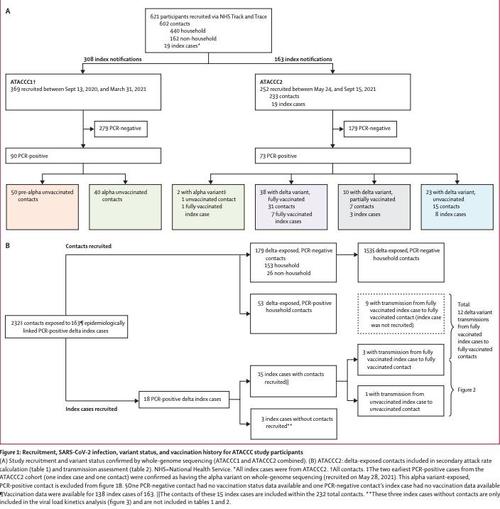The Lancet has just released another study comparing the efficacy of COVID vaccines to the efficacy of protection provided by previous COVID infections. Their conclusion: while vaccines lower the risk of infections with the delta variant within households, those who are fully vaccinated are still vulnerable to a 'breakthrough' infection if somebody they live with gets infected.
What's more, people who have been vaccinated against COVID can be equally as infectious as the unvaccinated, the study showed.
The new study, which was published Thursday in the Lancet, the British medical journal that published some of the earliest research on COVID, is one of few to use detailed infection data from actual examples of household transmission, and it showed that - as we noted above - the viral loads of both vaccinated and unvaccinated patients infected with COVID are "broadly similar".
The study involved 621 people in the UK with mild COVID infections, identified via the UK's contact-tracing system.
The data showed that vaccination status doesn't make a whole lot of difference in the ability to pass COVID on to others.
Roughly 25% of vaccinated household members subsequently tested positive for the virus after close contact with a fellow household member with a confirmed case of COVID. That's compared with 38% of infection for people who haven't been vaccinated.
These data show that the delta variant has a "greater capability for breaching the vaccine's defenses when compared with predecessors.
"Our findings show that vaccination alone is not enough to prevent people from being infected with the Delta variant and spreading it in household settings," said Professor Ajit Lalvani of Imperial College London, the co-leader of the study.
The study's author said the lower transmission rates between vaccinated patients is just another reason to get the jab - although not a particularly compelling one.
"The ongoing transmission we are seeing between vaccinated people makes it essential for unvaccinated people to get vaccinated to protect themselves from acquiring infection and severe Covid-19, especially as more people will be spending time inside in close proximity during the winter months," he said.
The study also underlines the importance of the vulnerable to get booster shots, since it also shows that vaccine immunity wanes with time.
"We found that susceptibility to infection increased already within a few months after the second vaccine dose – so those eligible for Covid-19 booster shots should get them promptly," the professor said.
Following a summary of its findings, the Lancet wrote the "interpretation" of the study: "Vaccination reduces the risk of delta variant infection and accelerates viral clearance. Nonetheless, fully vaccinated individuals with breakthrough infections have peak viral load similar to unvaccinated cases and can efficiently transmit infection in household settings, including to fully vaccinated contacts. Host–virus interactions early in infection may shape the entire viral trajectory."
Readers can find the full study below:

No comments:
Post a Comment
Note: Only a member of this blog may post a comment.